“The Ballad of Songbirds and Snakes: ”The Biggest Differences Between the Book and Movie
Here are the biggest book-to-movie differences in 'The Ballad of Songbirds and Snakes'
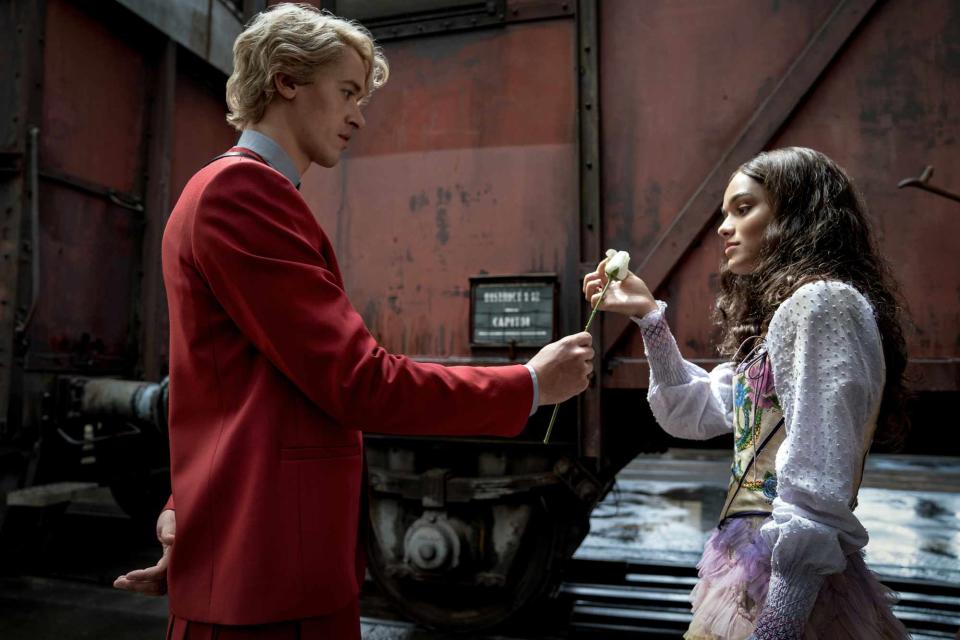
Murray Close/Courtesy of Lionsgate
The Ballad of Songbirds and Snakes is going from book to screen.
Based on Suzanne Collins’ novel of the same name, the new film serves as a prequel to the hit Hunger Games franchise. Following a young Coriolanus Snow before he became president of Panem, the movie takes place during the 10th annual Hunger Games as Snow is chosen as a mentor to a District 12 tribute named Lucy Gray.
Like the previous Hunger Games films, the movie adaptation stays incredibly true to the book, right down to the iconic quotes. However, with The Ballad of Songbirds and Snakes being over 500 pages long, a few things had to be changed to fit the film’s 2-hour and 38-minute runtime.
As a result, producer Nina Jacobson tells PEOPLE Collins played a crucial role in helping them adapt the script. "With Suzanne, part of why we work so closely with her is because she writes from theme and she knows what is essential about her characters," Jacobson says. "Each of these characters represents a very specific point of view and she wanted to make sure that those ideas made it to the screen."
"Because she wrote these books watching the polarization of our country and watching the way people have and are turning on each other with such vitriol and such intolerance, it was so important to her that we never fall into the trap of this person's a songbird, that person's a snake, that we are always both. We can find common traits with each other," she adds. "When we assume that one of us is the good one and the other one is the evil one, we're vulnerable, and that polarization is actually essential to giving power to people who ought not have it."
Ahead, read the biggest book-to-movie differences in The Ballad of Songbirds and Snakes.
Warning: major spoilers for The Ballad of Songbirds and Snakes ahead.
The film starts with the Dark Days
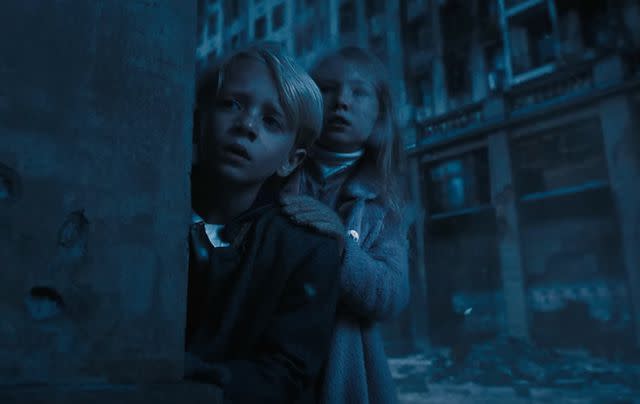
Lionsgate
The film starts with a flashback of young Coriolanus Snow and his cousin Tigris during the Dark Days, when the Capitol was in ruins and food was scarce. As they search for scraps of bread, they see a man chopping off the limb of a dead woman in the street, insinuating that some Capitol residents resorted to cannibalism during the war.
Though the scene plays out very similarly in the book, it comes later in the text; the book begins following Snow as he prepares to head to the Academy for Reaping Day.
Snow’s father is killed by a District 12 rebel
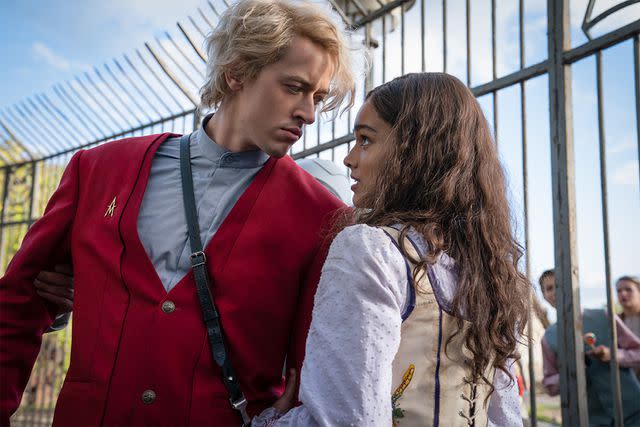
In the book, Snow reveals that his father, Crassus Snow, was a military general who was killed by a rebel during the First Rebellion.
However, the film takes it one step further; his Grandma'am says he was killed by a District 12 rebel. The slight tweak only further foreshadows President Snow’s eventual hatred for Lucy Gray and Katniss’ home district in the original franchise.
Related: Is Ballad of Songbirds and Snakes Suitable for Kids? What to Know About the PG-13-Rated Movie
The Plinth Prize is announced very early on
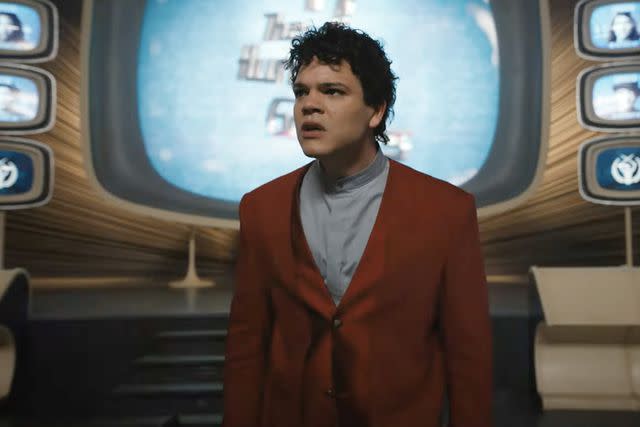
As Snow heads to the Academy in one of the film’s first scenes, he has high hopes of taking home the Plinth Prize, a monetary award created by Strabo Plinth, a former District 2 citizen who was able to buy his family’s way into the Capitol after supplying them with military weapons during the war.
Given his family’s financial situation, Snow has high hopes of receiving the award to give him enough funds to attend University. However, as the students are seated, Sejanus apologizes to Snow, letting him know there has been a change of plans for this year’s prize winner.
The introduction of the Plinth Prize plays out much differently in the book. Strabo Plinth doesn’t announce his plans for the prize until about halfway through the Hunger Games after his son Sejanus sneaks into the arena and almost gets him and Snow killed. As Snow says in the book, it was a “hasty attempt to bury his son’s outrageous behavior in cash.”
Having mentors in the Hunger Games is a surprise
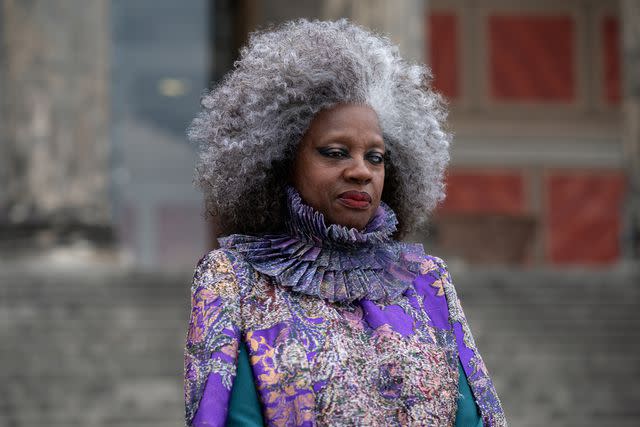
Murray Close/Lionsgate
Another small tweak at the beginning of the film is the news that Academy students will serve as mentors in the Hunger Games. In the book, Snow has already been chosen as a mentor for being one of the top students in his class, however, in the film, the introduction of mentors is a big shock.
As Dr. Gaul takes the stage, she reveals that in lieu of awarding the Plinth Prize to the top student, the award will be given to the student who shows the most promise as a mentor in the games, with Dean Highbottom later adding that it is their job to make the tributes into spectacles, not survivors.
Snow and Sejanus work together to give tributes food
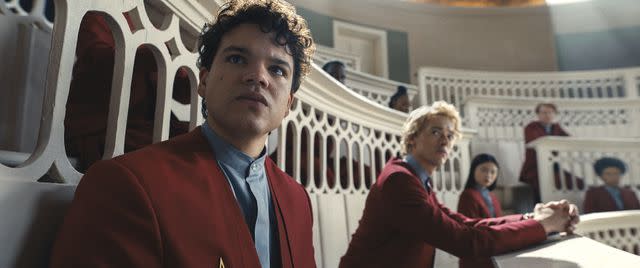
Courtesy of Lionsgate
Snow and Sejanus’ alliance to help the tributes plays out a bit differently on screen. In the film, Snow and Sejanus make the plan together, however, in the book, it was all Sejanus’ idea. The only reason Snow even goes along with it is because he doesn’t want Sejanus to get all the spotlight from reporters at the zoo.
Lepidus and Lucky’s characters are combined
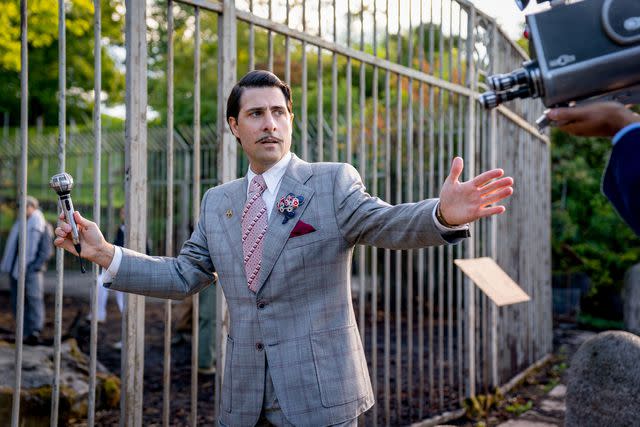
Murray Close/Courtesy of Lionsgate
Lucretius "Lucky" Flickerman, a weathercaster for the Capitol and an ancestor of Caesar Flickerman from the original franchise, serves as the very first host of the Hunger Games. Though Lucky is tapped to conduct interviews for the games, most of the live reporting about the tributes in the zoo is done by a reporter for Capitol News named Lepidus Malmsey in the book.
However, in the film, their characters are somewhat combined as Lucky also interviews the tributes at the zoo. Additionally, Lucky’s signature pet parrot Jubilee doesn’t make an appearance in the film, though Lucky still does magic tricks.
Clemensia’s fate is never revealed
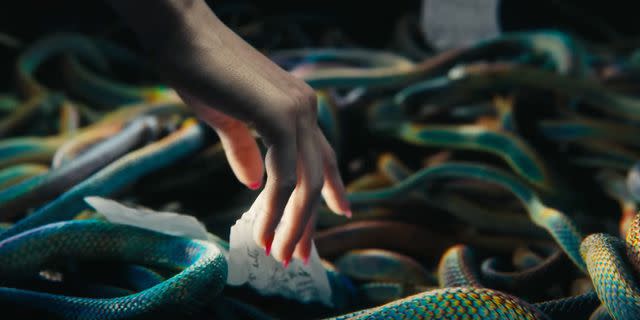
Lionsgate
Perhaps one of the biggest differences in the film is that Clemensia’s fate after getting bit by one of Dr. Gaul’s snakes is never revealed. Instead, her character’s storyline is cut short and she doesn’t make an appearance again.
In the books, however, Clemensia does survive but has strange side effects from the snake bite. While getting treated in the hospital after the arena bombing, Snow comes face to face with Clemensia, revealing that her eyes have turned yellow, her tongue periodically juts from her mouth and she has developed rainbow scales like the snakes.
Following her hospital stay, she returns as a mentor in the Hunger Games, though her demeanor has completely shifted as she becomes irritable and cold to her classmates.
Some of the deaths in the Hunger Games happen differently
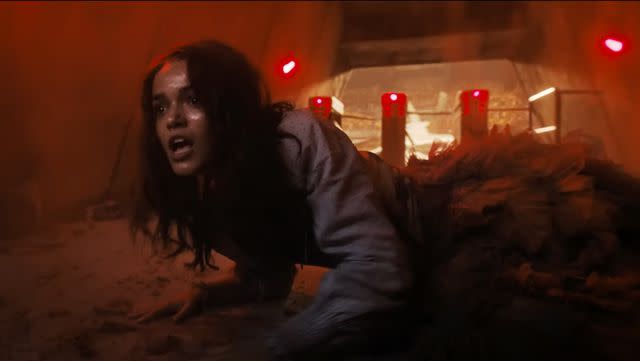
Lionsgate
A handful of character deaths are altered in the film. For instance, the causes of Wovey and Dill’s deaths are swapped. In the book, it’s actually Wovey who drinks poisoned water, whereas Dill simply dies from complications due to tuberculosis.
Additionally, Reaper’s death plays out differently. In the book, Reaper manages to evade Dr. Gaul’s rainbow snakes and the competition comes down to him and Lucy Gray. In their final confrontation, Lucy Gray tries to tire Reaper out, knowing he previously contracted rabies from Jessup. In the end, Reaper meets his demise when he drinks water from a puddle, not realizing Lucy Gray had contaminated it with rat poison.
Snow’s time as a Peacekeeper gets condensed
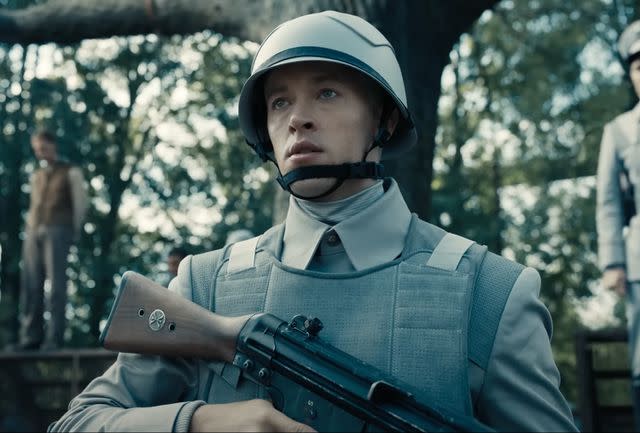
Lionsgate
Various events from Snow’s time as a Peacekeeper happen a bit differently in the books. In the film, Snow reunites with Sejanus on the train to District 12, however, in the book Sejanus doesn’t appear until later on. In fact, Snow is contemplating suicide when Sejanus shows up and reveals he has also enlisted as a Peacekeeper.
Additionally, Snow’s orders to head to District 2 are revealed much sooner in the film, whereas in the book, Snow doesn’t learn about his plans for transportation until right after he agrees to run away with Lucy Gray.
Lucy Gray and Snow’s confrontation in the cabin happens differently
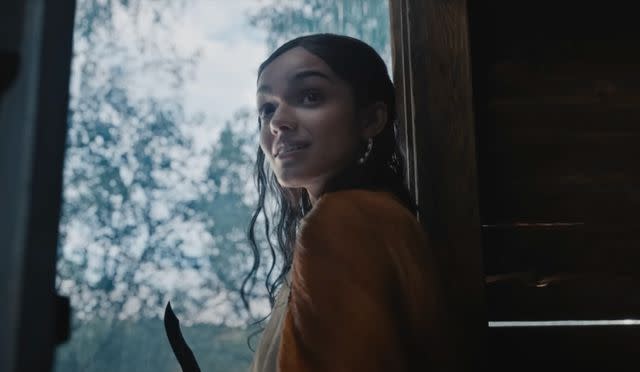
Lionsgate
Lucy Gray and Snow’s conversation in the cabin plays out differently in the movie. After Snow finds the guns in the cabin, Lucy Gray makes a comment that he now has no loose ends to stop him from returning to his past life at the Capitol — other than her. The moment feels like Lucy Gray is testing Snow to see if he is truly trustworthy.
However, in the book, Snow and Lucy Gray don’t have a confrontation after he finds the guns and the topic of “loose ends” happens in his own inner monologue as he begins to question whether or not Lucy Gray is trustworthy and wonders if she will expose him for Mayfair’s death if he returned to District 2 without her — which leads to their eventual face-off in the woods.
For more People news, make sure to sign up for our newsletter!
Read the original article on People.

